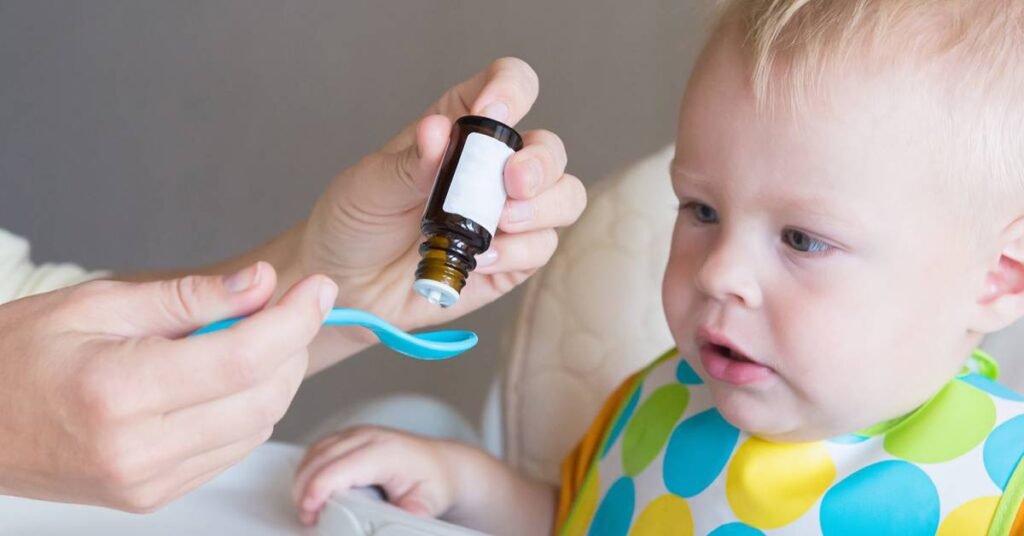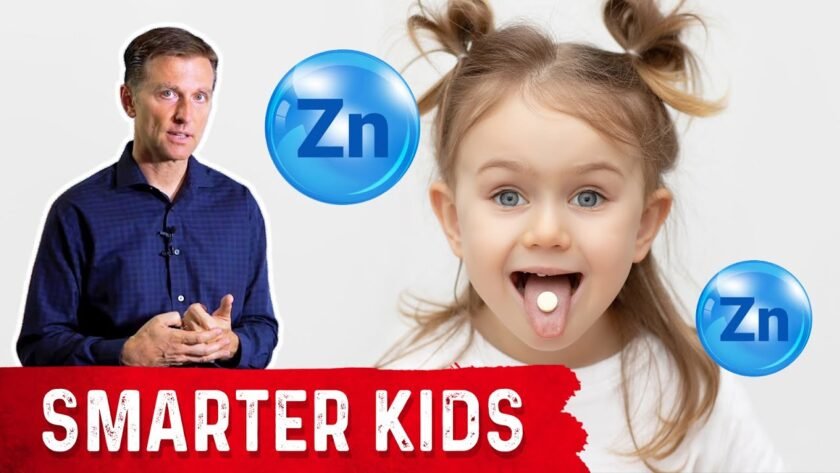Table of Contents
Did you know that zinc plays a crucial role in your child’s development, especially for those growing brains? Today, we’re talking about the importance of zinc for kids—why they need it, what foods can zap their zinc levels, and how to ensure they get enough of this essential mineral.
Brief The Article:
Do Kids Need Zinc? Why is Zinc Important for Kids?
- Yes! Zinc is essential for children, especially for brain development and cognitive functions like thinking, memory, and speech.
- Zinc is vital for the proper functioning of neurons in the forebrain, the area of the brain responsible for cognitive processes.
Consequences of Zinc Deficiency in Kids:
- Research links zinc deficiency to neuropsychological problems, particularly impacting reasoning ability—the capacity for logical, sensible thought.
- Teenagers experiencing a lack of reasoning skills may be suffering from a simple zinc deficiency.
- Insufficient zinc can hinder a child’s ability to learn, pay attention, and retain information, leading to poor memory.
- Studies also show a correlation between zinc deficiency and decreased playfulness in children.
Zinc and Pregnancy:
- It is crucial for pregnant and breastfeeding women to have sufficient zinc intake because a deficiency can negatively affect a child’s cognitive development, especially their memory.
What Depletes Zinc?
- Phytic acid is a primary culprit in zinc deficiency in children. It is found in:
- Cereal grains
- Corn and corn products
- Soy and soy products
- Wheat, especially whole wheat (which contains more phytic acid than refined white flour).
- Phytic acid binds to zinc, making it difficult for the body to absorb.
Ensuring Adequate Zinc Intake in Kids:
- Reducing grain consumption and incorporating healthy, zinc-rich foods into children’s diets is essential. A healthy ketogenic diet can be beneficial.
Zinc and Immunity:
- Adequate zinc levels contribute to a stronger immune system, helping children better resist environmental factors and stay healthy.
Key Takeaway:
Zinc is crucial for children’s growth, cognitive development, and overall health. Understanding the critical role of zinc and knowing how to ensure adequate intake by avoiding phytate-rich foods can help set children up for success in their learning and development.
So let’s dive into the details…
Zinc for Kids

Now it’s very very important if you have children to make sure that those kids, especially if they’re very young, have enough zinc for kids in their diet and to make sure they’re not consuming anything that can be depleting them of zinc.
Mostly because the neurons in the forebrain are dependent on zinc, that’s the part of the brain that’s involved in the cognitive processes thinking memory speaking.
Key Points:
- Zinc for kids is crucial for cognitive development
- Forebrain neurons depend on zinc
- Zinc supports thinking, memory, and speaking abilities
Why kids need zinc

There’s two very interesting studies that show the link between having a zinc deficiency and experiencing neuropsychological problems, especially reasoning.
Now reasoning has to do with thinking about something in a logical sensible way. Now if you have teenagers by the way you may have experienced some lack of reasoning occasionally.
Well that could be a simple zinc for kids deficiency because zinc has everything to do with supporting the cognitive part of your brain.
Effects of Zinc Deficiency:
- Neuropsychological problems
- Impaired reasoning abilities
- Possible link to teenage behavior
If you don’t have enough zinc for kids, you inhibit the capacity to learn, you reduce the ability for someone to have attention on what they’re doing, you cause poor retention of data that’s called poor memory and they even found that kids that are deficient in zinc play less than kids that have enough zinc.
Impact of Zinc Deficiency on Children:
- Reduced learning capacity
- Decreased attention span
- Poor memory retention
- Less playful behavior
Zinc and pregnancy

Interesting if a mother who’s carrying a child is deficient in zinc she could pass on a child that has poor memory. So it’s very very important if you’re pregnant to take zinc for kids, if you’re breastfeeding to take zinc, and as a child to take zinc.
Zinc During Pregnancy and Breastfeeding:
- Maternal zinc deficiency can affect child’s memory
- Zinc supplementation important during pregnancy
- Continued zinc intake crucial while breastfeeding
What depletes zinc?

Now I think it’s probably very important to talk about what depletes zinc more than taking zinc because the number one reason why kids are deficient in zinc is because of phytic acid and you get phytic acid in cereal.
, the amount of cereal that these kids eat is just blocking their zinc. Cereal, corn, corn chips, popcorn, soy, soy products, it’s in so many different things and also wheat because grains have phytic acid especially in the bran as in whole wheat.
Sources of Phytic Acid (Zinc Inhibitor):
- Cereal
- Corn and corn products
- Soy and soy products
- Wheat and whole grains
There’s more phytic acid in whole wheat than there is in refined wheat as in white flour. So we need to get our kids off these grains, we need to get them on healthy keto, and we need to make sure they have enough zinc for kids.
Summary
- Zinc is important for kids mostly because the neurons in the forebrain are dependent on zinc. This is the part of the brain involved in cognitive processes, including thinking, memory, and speech.
- There are two studies that show a link between a zinc deficiency and neuropsychological problems, especially reasoning.
A zinc deficiency could potentially:
• Inhibit a person’s ability to learn
• Reduce the ability to have attention
• Cause poor retention of data (poor memory)
It’s also important for pregnant and breastfeeding mothers to take zinc.
The number one thing that depletes zinc is phytic acid. Phytic acid is in things like:
• Cereal
• Corn
• Soy
• Wheat
Additional-resources
FAQ
Why is zinc important for kids?
Zinc is crucial for children’s health and development:
- Cognitive Function: Supports brain development and cognitive processes.
- Immune System: Enhances immune function, protecting against infections.
- Growth and Development: Essential for proper physical growth and development.
- DNA Synthesis: Plays a vital role in cell division and DNA formation.
- Wound Healing: Accelerates wound healing and skin health.
- Taste and Smell: Supports sensory functions of taste and smell.
- Hormone Production: Involved in the production of growth hormone and sex hormones.
Adequate zinc intake is critical for children’s overall health, learning abilities, and immune defense.
Can I give my child zinc everyday?
Daily zinc supplementation for children should be approached cautiously:
- Dietary Intake: Focus on zinc-rich foods as the primary source.
- Age-Specific Needs: Daily requirements vary by age (2-3 mg for infants, 5-8 mg for children).
- Supplementation: Only if recommended by a healthcare provider.
- Duration: Short-term supplementation is generally safer than long-term.
- Potential Risks: Excessive zinc can interfere with copper absorption and cause other side effects.
- Balanced Diet: A varied diet often provides sufficient zinc without supplements.
- Medical Supervision: Always consult a pediatrician before starting daily zinc supplements.
While zinc is essential, it’s important to maintain proper balance and avoid excessive intake.
What happens if children don’t get enough zinc?
Zinc deficiency in children can lead to various health issues:
- Growth Retardation: Slowed physical growth and development.
- Cognitive Impairment: Reduced learning ability and memory function.
- Weakened Immune System: Increased susceptibility to infections.
- Skin Problems: Dermatitis and slow wound healing.
- Behavioral Changes: Irritability, lethargy, and decreased appetite.
- Delayed Sexual Maturation: In adolescents.
- Taste Alterations: Reduced sense of taste (hypogeusia).
- Hair Loss: In severe cases, can lead to alopecia.
- Diarrhea: Increased risk and severity of diarrheal episodes.
- Night Blindness: Impaired vision, especially in low light conditions.
Addressing zinc deficiency is crucial for preventing these potential health problems in children.
Why is zinc important?
Zinc is essential for numerous bodily functions:
- Immune Function: Crucial for both innate and adaptive immunity.
- Protein Synthesis: Vital for building and repairing tissues.
- Wound Healing: Accelerates healing of wounds and injuries.
- DNA Synthesis: Essential for cell division and growth.
- Enzymatic Reactions: Acts as a cofactor in over 300 enzymatic reactions.
- Antioxidant Properties: Protects cells from oxidative stress.
- Hormone Regulation: Involved in the production and regulation of hormones.
- Neurotransmitter Function: Supports brain function and neurotransmitter activity.
- Sensory Functions: Important for taste and smell perception.
- Reproductive Health: Crucial for fertility and reproductive organ development.
Zinc’s diverse roles make it indispensable for overall health and well-being across all age groups.
Zinc dosage for child diarrhea
Zinc supplementation for child diarrhea follows specific guidelines:
- WHO Recommendation: 10-20 mg of zinc daily for 10-14 days.
- Age-Specific Dosage: 10 mg for infants under 6 months, 20 mg for older children.
- Duration: Continue for the full course, even if diarrhea stops earlier.
- Form: Usually given as zinc sulfate, gluconate, or acetate.
- Administration: Best given with ORS (Oral Rehydration Solution).
- Frequency: Once daily, preferably with food.
- Preventive Effect: Can reduce future diarrheal episodes for up to 3 months.
Always consult a healthcare provider for the appropriate dosage based on the child’s specific condition.
Maximum zinc dosage for child
The maximum safe zinc dosage for children varies by age:
- Infants (0-6 months): 4 mg/day
- Infants (7-12 months): 5 mg/day
- Children (1-3 years): 7 mg/day
- Children (4-8 years): 12 mg/day
- Children (9-13 years): 23 mg/day
- Adolescents (14-18 years): 34 mg/day for boys, 34 mg/day for girls
These are upper limits and not recommended daily intakes. Regular intake should be lower. Always consult a pediatrician before giving zinc supplements to children.
Zinc dosage for child with cold
Zinc dosage for children with colds:
- Age 1-5 years: 10 mg/day for 5-10 days
- Age 6-12 years: 15-20 mg/day for 5-10 days
- Adolescents: 25-30 mg/day for 5-10 days
- Form: Zinc gluconate or zinc acetate lozenges are often used
- Timing: Start within 24 hours of symptom onset for best results
- Frequency: Dissolve lozenge in mouth every 2-3 hours while awake
- Duration: Continue until symptoms resolve, typically 5-10 days
Always consult a healthcare provider before giving zinc supplements to children, especially for extended use.
Zinc for child diarrhea
Zinc supplementation is effective for treating and preventing child diarrhea:
- Dosage: 10-20 mg daily, depending on age
- Duration: 10-14 days, as recommended by WHO
- Effectiveness: Reduces duration and severity of diarrhea by about 25%
- Prevention: Can prevent future episodes for up to 3 months
- Combination Therapy: Often given with Oral Rehydration Solution (ORS)
- Mechanism: Improves water and electrolyte absorption in the intestines
- Safety: Generally well-tolerated when used as directed
Zinc supplementation is a cost-effective intervention for reducing childhood mortality from diarrhea.
Best zinc supplement for kids
When choosing a zinc supplement for kids, consider:
- Zinc Gluconate: Well-absorbed and gentle on the stomach
- Zinc Picolinate: Highly bioavailable form
- Zinc Citrate: Another easily absorbed option
- Liquid Formulations: Easier for younger children to take
- Chewable Tablets: Good for older children
- Zinc + Vitamin C: Combination can enhance absorption and immune support
- Third-Party Tested: Choose brands that undergo independent quality testing
Always consult a pediatrician before starting any zinc supplement regimen for children.
Zinc for children benefits
Zinc offers numerous benefits for children:
- Enhanced Immune Function: Helps fight off infections and reduces illness duration
- Cognitive Development: Supports brain function and learning abilities
- Growth Promotion: Essential for proper physical growth and development
- Skin Health: Aids in wound healing and maintains healthy skin
- Digestive Health: Helps prevent and treat diarrhea
- Sensory Function: Supports normal taste and smell perception
- Hormone Balance: Important for proper hormone production and regulation
- Antioxidant Protection: Helps protect cells from oxidative stress
- Protein Synthesis: Crucial for building and repairing tissues
- Enzyme Function: Acts as a cofactor in numerous enzymatic reactions
Ensuring adequate zinc intake is vital for children’s overall health and development.
Zinc for babies benefits
Zinc provides essential benefits for babies:
- Immune System Development: Strengthens the immune response
- Brain Development: Supports cognitive function and neurodevelopment
- Growth: Essential for proper physical growth and development
- Cellular Division: Crucial for rapid cell growth in infancy
- Digestive Health: Helps prevent and manage diarrhea
- Skin Health: Aids in maintaining healthy skin and faster wound healing
- Sensory Development: Supports the development of taste and smell
- Protein Synthesis: Important for building new tissues
- Antioxidant Protection: Helps protect developing cells from damage
- Hormone Regulation: Supports proper endocrine function
Adequate zinc intake is crucial for the healthy development of infants.
Zinc for kids dosage
Zinc dosage for kids varies by age and purpose:
- Infants (0-6 months): 2 mg/day (Adequate Intake)
- Infants (7-12 months): 3 mg/day (RDA)
- Children (1-3 years): 3 mg/day (RDA)
- Children (4-8 years): 5 mg/day (RDA)
- Children (9-13 years): 8 mg/day (RDA)
- For diarrhea treatment: 10-20 mg/day for 10-14 days
- For cold treatment: 10-30 mg/day, depending on age, for 5-10 days
Always consult a pediatrician before starting zinc supplementation, as needs may vary based on individual health status and dietary intake.



